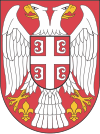LGBT history in Serbia
Homosexuality in Serbia was technically legal 1807-1813 (because Karađorđe Crimminal Code omitted any references to it) and between 1858, when the Ottoman Empire of which Serbia was nominally a vassal decriminalised male homosexuality, and 1860 when prince Miloš Obrenović pushed through a new Criminal Code which punished male anal intercourse with 6-48 months imprisonment). From 1860 it was legally punishable through several regime changes until it was finally decriminalised once again in 1994.[1]
The first pride walk took place in 2001. As the walked progressed in Belgrade, it was stopped when protesters and police clashed with one another.[2] In the years, 2009, 2011, 2012, and 2013, the LGBT community of Serbia scheduled a gay pride walk that received the treatment of getting banned each year by the authorities in the country.[3]
In 2010, the pride march was attempted again.[3] Similar results to the first march, this march was visited by thousands of individuals such as football fans and members of "right-wing" organizations.[3] These individuals caused destruction, such as throwing missiles, stones, and setting cars on fire.[3] The mayhem destroyed the walk, and also injured police officers.[3] This march was overshadowed by 6,500 protesters.[4] The pride walk was banned in 2011 which led the members of the gay community to believe that this act was a sign that supported violence towards gay people.[2] Those in the Serbian LGBT community feared for their lives, due to severe cruelty by people with homophobic mindsets.[2] Risks of violence continued to be high in Serbia against the LGBT community.[5] Fourteen percent of respondents who took a survey, felt as if acts of violence was a proper way to respond to homosexuality.[5]
Boris Melicevic was an openly gay leader for Serbia who became a part of a political party in December 2010.[2] In 2010, Serbia passed the "anti-discrimination law", which protected LGBT Serbians from being treated unequal.[2] More than half of Serbians say that they are against violence and discrimination against homosexuals, however roughly two-thirds of the country believed that identifying as a homosexual was a disease.[2] In 2008, the Serbian Medical Society determined that being LGBT was not a disease, being a member of the " World Health Organization", deferring from its opinions.[6]
In Socialist Autonomous Province of Vojvodina homosexuality was decriminalised in 1977,[7] but when Vojvodina was re=introduced fully into the Republic of Serbia legal system during the breakout of Yugoslavia, it was recriminalised again, until 1994.
Yugoslavia
In 1937 Belgrade based daily newspaper Politika published news about young man from Central Serbia who arrived in Belgrade with his brothers to change his sex.[8]
There are sources about homosexual Yugoslav Partisans during World War II in Yugoslavia. Milovan Đilas in his war memoirs tells the story from Sandžak where one Muslim soldier was exposed as homosexual by other soldiers and Regional Secretary.[9] Regional Secretary in doubt ask Đilas if he should "execute this freak", while Đilas remains in doubt admitting that at the time he did not know Communist Party of Yugoslavia practice nor anything was said about such matters by Marx and Lenin.[9] At the end under common sense he concluded that "from such vices suffer proletarians, and not only bourgeois decadent" but that he can not have functions or be party member.[9] Đilas says that he only later learned "that that homosexual, who in appearance was sheer manhood, was very brave and courageously fell in battle".[9]
In 1990 in Hotel Moskva in Belgrade, which was popular gay gathering place in 70-ties, one gay and lesbian group began to organize meetings and in January 1991 they founded organization Arkadija.[10]
21st century
- 2009 GayEcho declared Jelena Karleuša to be gay icon in Serbia.[11]
See also
References
- ↑ "Where is it illegal to be gay?". BBC News. Retrieved 12 February 2014.
- 1 2 3 4 5 6 "Serbia: For gays, a ghetto in modern Europe". Public Radio International.
|access-date=requires|url=(help) - 1 2 3 4 5 "Serbia Gives Green Light to Gay Pride Parade :: Balkan Insight". www.balkaninsight.com. Retrieved 2017-05-07.
- ↑ "Homophobia still tolerated by governments around the world". www.amnesty.org. Retrieved 2017-05-07.
- 1 2 http://search.ebscohost.com/login.aspx?direct=true&db=mnh&AN=21774599&site=ehost-live&scope=site%5Bfull+citation+needed%5D
- ↑ "SERBIA | LGBTI Equal Rights Association for Western Balkans and Turkey". www.lgbti-era.org. Retrieved 2017-05-07.
- ↑ L. Grubić-Radakovi. "Seksualna delinkvencija u suvremenom krivičnom pravu" (PDF) (in Serbo-Croatian). Retrieved 13 April 2014.
- ↑ Centar za kvir studije. "Politika: Promena pola 1937. godine" (in Serbian). Retrieved 20 March 2015.
- 1 2 3 4 "LGBT PRAVA U SFRJ" (in Serbo-Croatian). Retrieved 20 March 2015.
- ↑ Spahić and Gavrić, Aida and Saša (2012). Čitanka LGBT ljudskih prava, 2. dopunjeno izdanje (PDF) (in Serbo-Croatian). Sarajevo: Sarajevski otvoreni centar/Heinrich Böll Foundation. ISBN 978-9958-577-02-4. Retrieved 20 March 2015.
- ↑ "LGBT pjesme sa prostora bivše Jugoslavije (i neke kasnije)". Labris. Retrieved 13 April 2014.
